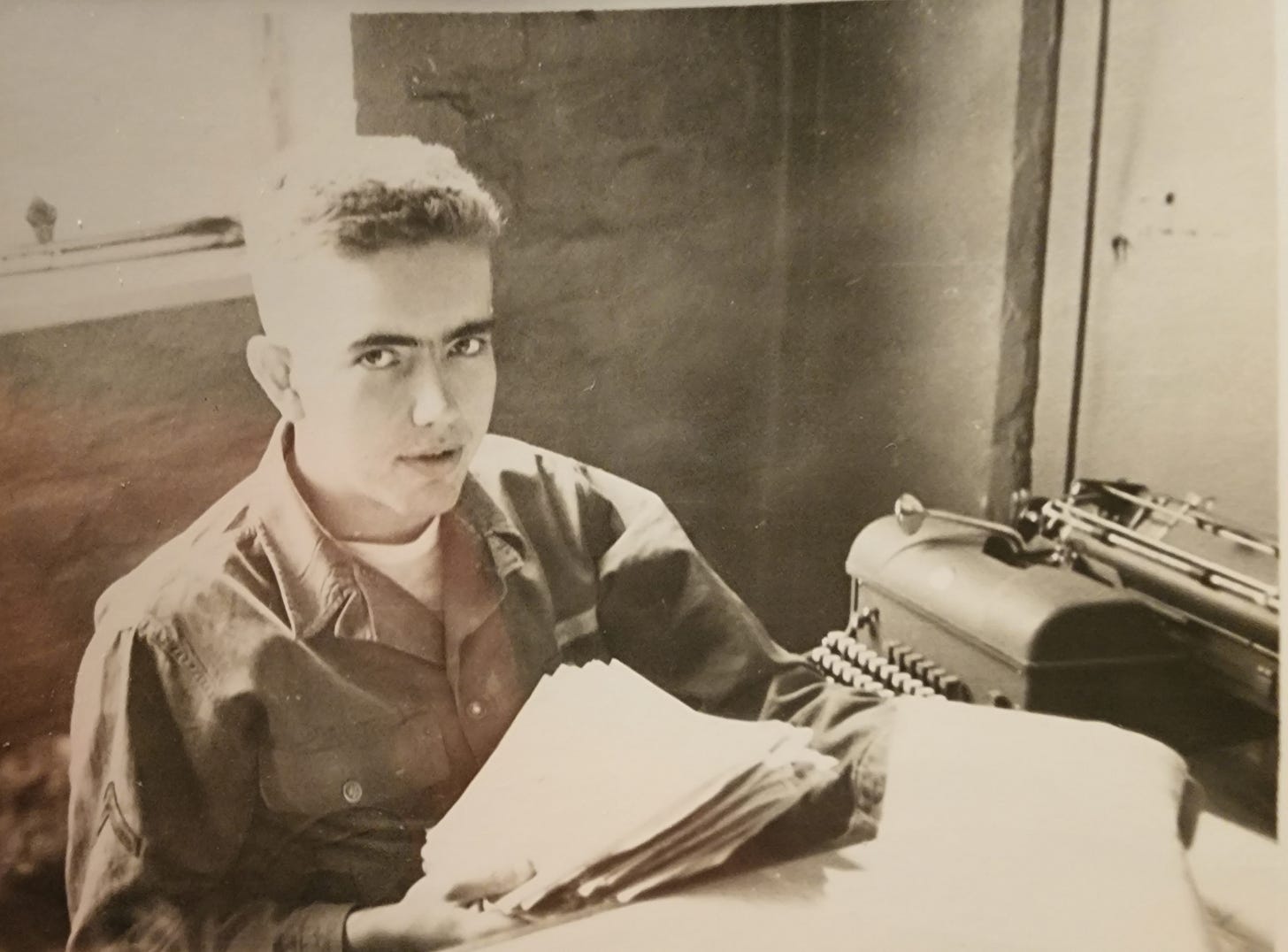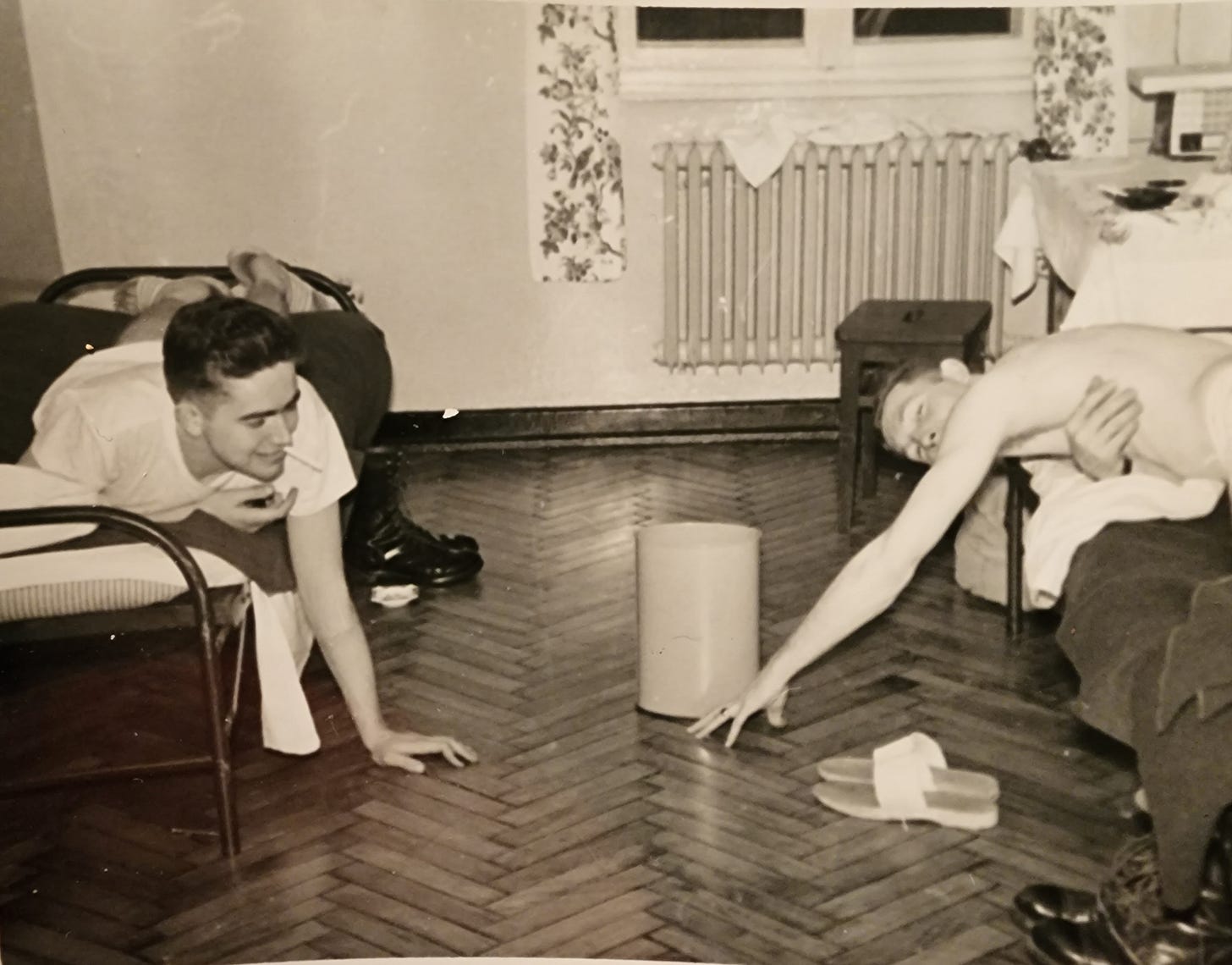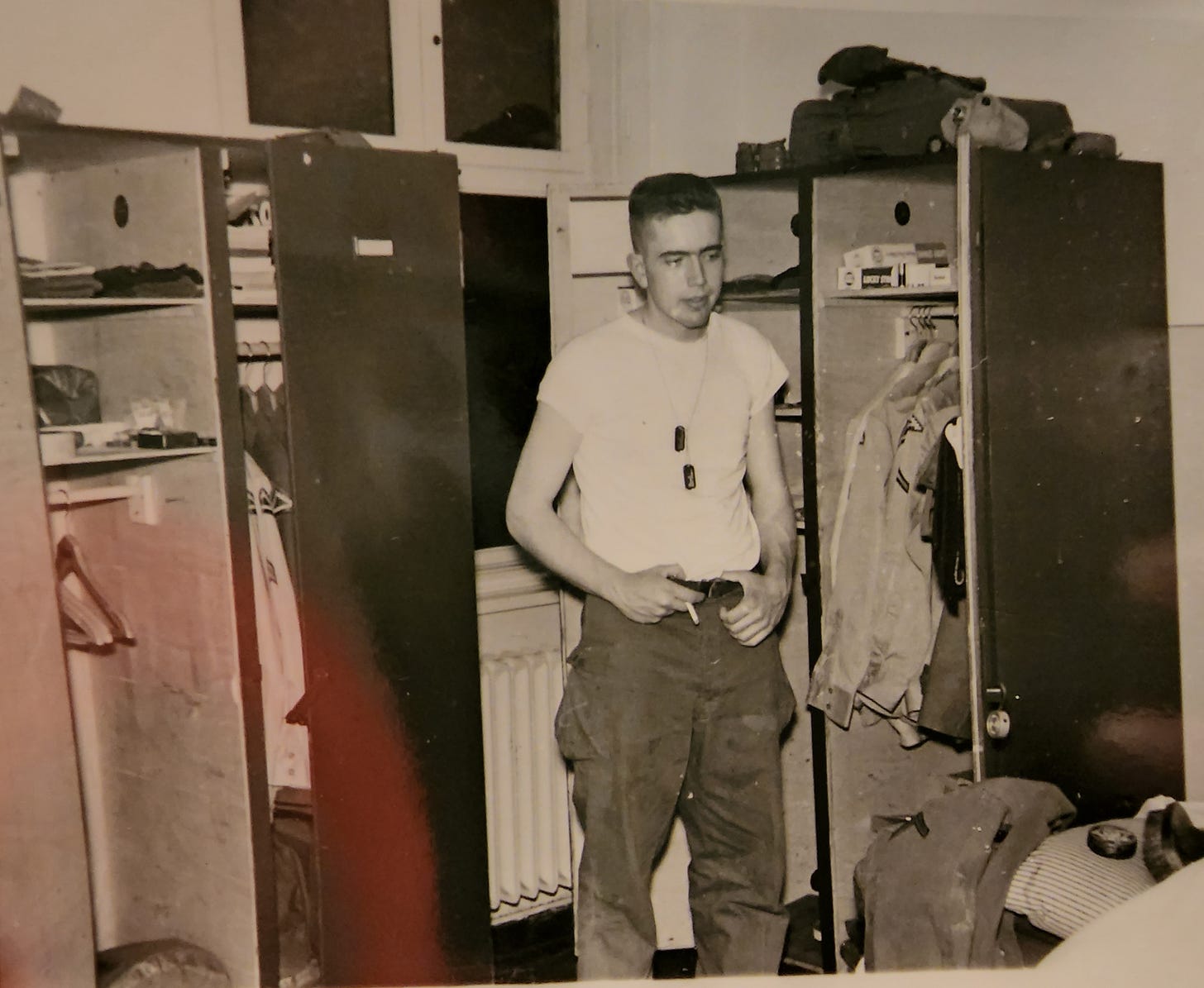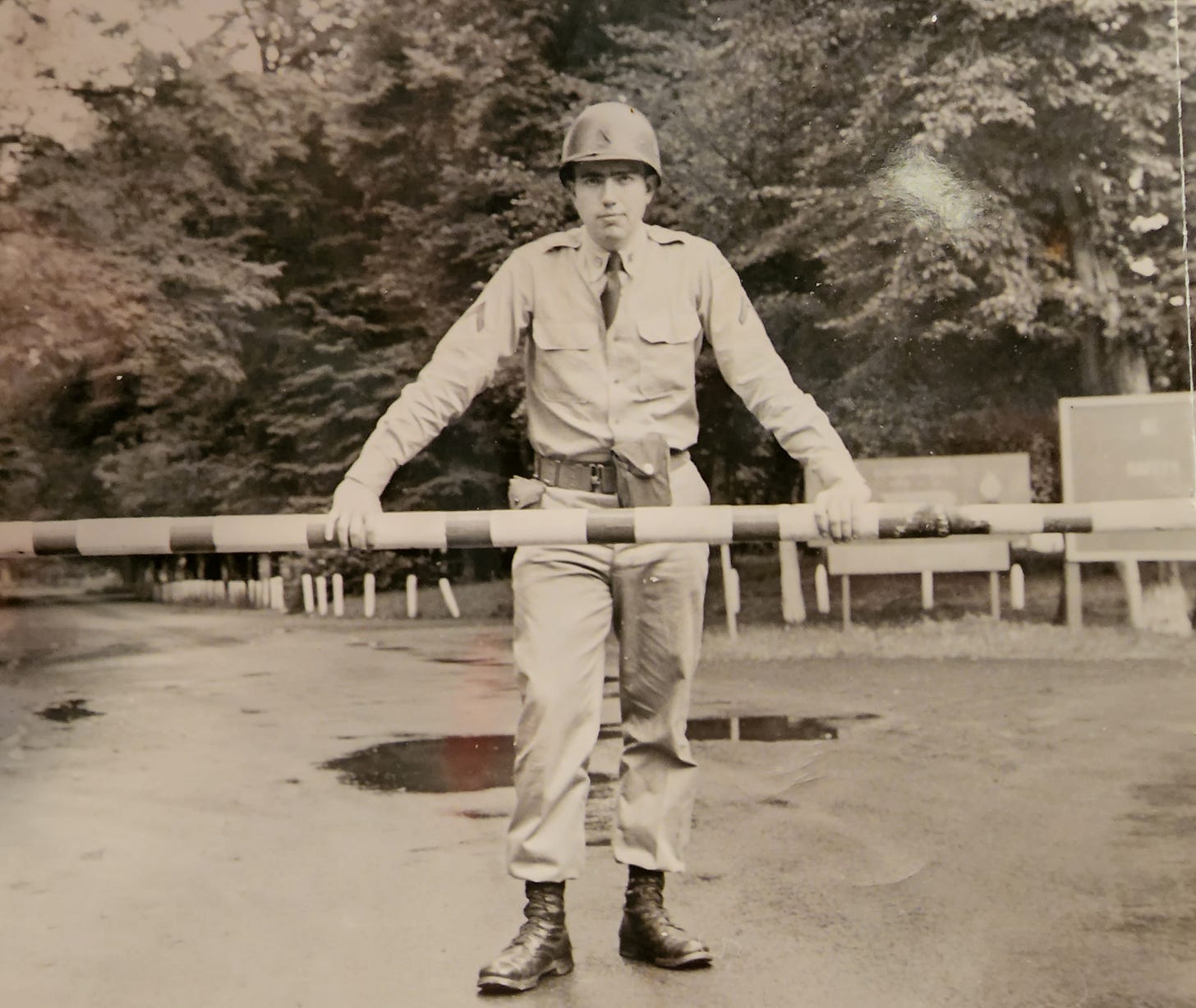Lucky Dan Goes to Germany - Not Korea
After appearing on a network TV show, I was again Lucky to be assigned to the occupation forces in Germany, and not to Korea, where the uncertain truce could end at any time. This is what I remember as I waited to come home and restart my life again.
How I Got to Germany
The Army offered me more than one opportunity to go to OCS—Officer’s Candidacy School—but I turned them all down because they all required me to spend one more year in the army, and I didn’t want that. At Fort Riley, my job as an entertainment specialist was a dream come true. But it ended in a few months when the Army reorganized itself. The 10th Infantry Division was being split up and deployed to who knows where.
My barracks housed division headquarters personnel, and they were an eclectic bunch. But again, I was lucky. The guy next to me was an intelligent, good-looking guy who was also an entertainment specialist. He was also a professional actor. I’ll refer to him in this story as CL. And you’ll see why soon. CL had been to the Pasadena Playhouse in California. We hit it off and talked about art a lot. I had taken two years of art courses at the University of Illinois, but he just loved art.
We also talked a lot about where we might be going, after they told us they were breaking up our division. Then, one night, CL told me we were both going to Germany. “Are you sure?” I asked. He said he was, and indicated he knew someone in personnel. In other words, he had “connections”. That was great news. Many troops at Fort Riley would be going to Korea to replace the troops returning home.
The Army gave us a couple of weeks to prepare and CL and I decided to make a trip together to his home, in Deadwood, South Dakota, and then to my new home, in Meana, Arkansas. We did it by bus. I remember having a bad cold when I got on the bus in Deadwood, and it was gone three days later, when we arrived in Mena, Arkansas.
My Father’s Question
My parents seemed to like my army friend, CL, but when we were alone, my father had a question I found puzzling. He asked me, “What is your relationship with this man?” I told him CL was a good friend, but my father’s question continued to bother me until I finally told CL, hoping to gain some understanding.
CL now decided to tell me he was gay. “Gay?” I blinked. I was naïve. CL then began my education about homosexuals in the world, including in the Army. It was all new to me. I was surprised to learn how many artists, of all types, were gay, and that most of the men in our Entertainment Specialist unit were gay. I had no idea. But I wasn’t uncomfortable. I had never been propositioned by anyone, probably because everyone knew I was one of the few straight men in the unit. CL didn’t tell me then, but I learned 60, yes I said 60, years later, that he had made it possible through his gay community connections for both of us to go to Germany. When we got to Germany, CL was sent to Heidelberg and I was sent to an ordinance company in Hanau. It was then that my friend told me we could no longer continue to hang out together, given the different lives we were to lead. I’m sure he was right. His lifestyle was not one I would find understandable at that time. CL had opened a new door to the world for me in Germany, and I’m grateful to him for that.
The Best Meal I’ve Ever Had
On board our troopship, CL’s connections got me an opportunity to play the piano in an officer’s club, and the best job I could have had on the ship; I was the artist for the ship’s newspaper. The newspaper was actually a one sheet newsletter mimeographed and distributed each day around the ship. The mimeograph operator was a Greek with good connections of his own.
After a few days at sea, most of the troops were seasick and that’s why we couldn’t go down to eat in the ship’s galley. There was so much throwing up in the galley, you couldn’t even walk down the stairway. The smell was beyond description. We stopped trying and began to get very hungry. This is when our Greek mimeograph operator became our hero. He knew some of the ship’s cooks. He negotiated a forbidden trade; he offered them some fine Greek brandy for one loaf of freshly baked white bread. To this day, if I want to find out if someone has ever been extremely hungry, I mean near starving, I ask him or her, what is the best meal you’ve ever had? If they start talking about fine restaurant cuisine, I know they’ve never experienced what we did on that ship. My best meal ever, without any exceptions, was the loaf of white bread the Greek shared with us that day.
The Ordinance Corps?
With my entertainment history at Fort Riley, you may think I would easily continue in entertaining when I got to Germany. In fact, that’s what a personnel guy at Fort Riley had indicated. But he lied. The Army offered me two options when I got to Germany: (1) the infantry, where I would be living in the field ten months out of the year, and always sleeping with my entrenching tool, by my side, as a weapon, or (2) the ordinance corps, where I would be fixing trucks and other vehicles. Which one would you have chosen?
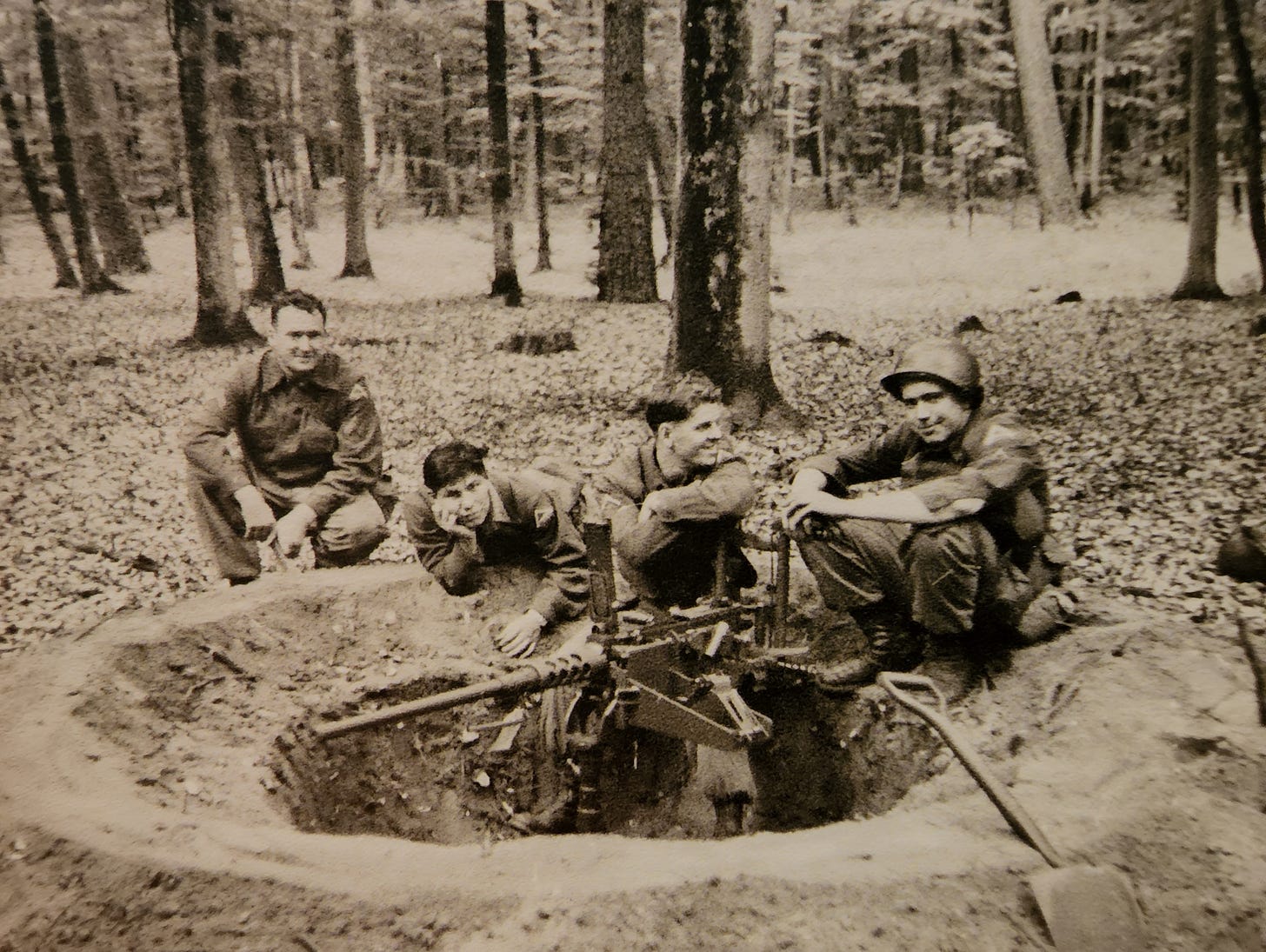
The ordinance company I was assigned to was located in Hanau, a town about 30 miles west of Frankfurt. Hanau was famous mainly for being the birthplace of the brothers Grimm, and their start-up of the fairy tale genre. Just before World War II ended in 1945, the British staged a massive bombing that destroyed 85% of Hanau’s buildings, including its historic landmarks. Nine years later, in 1954, when I arrived, the devastation could still be seen along the side streets. I remember seeing people living in apartment buildings with missing walls and floors and walking around giant piles of rubble.
But the military barracks we lived in were in pristine condition. Originally built for the German infantry, they could be called architectural marvels. With stone and tile, all of our living needs were serviced inside one well organized building.
The shops where vehicles were repaired, however, were miles away. Every morning and evening, trucks would commute us between our living and work areas.
I got lucky again. The shops needed a typist and I had taken a typing course in high school. I had a German manual typewriter to type requisitions for parts. Each part had an 8-digit identification number. Each requisition required 8 copies; which meant I had to use 8 pieces of carbon paper. Imagine my stress when making corrections, and there were many.
I Get a Better Job
My boss was a sergeant who didn’t say much. But when he was replaced less than six weeks later by another sergeant, I got a shock. My new sergeant took me aside and quietly explained that he was going to correct my evaluations. My prior sergeant was giving me very low evaluations every day. My new sergeant explained why, “He hates college kids.” My new sergeant and I got along very well, and when he started evaluating my work fairly, the top sergeant in the company told me I showed the most improvement of any man in the company. He soon selected me to be the Troop Information & Education NCO (Non-Commissioned Officer). That’s a misnomer, actually; I was never a non-commissioned officer—just a lowly private first class. But I now worked back in the main office in our barracks building. It was a real promotion to me. I was befriended by the top sergeant. He thought I gave the best presentations of troop information he had ever seen.
Corporal Hayes
I was open to making friends with anyone, but I found no more CLs to sit and talk art with. One other G.I. seemed to be highly regarded by our company commander. “Corporal Hayes”, he said, “looks better in his fatigues (work uniform) than the rest of us looked in our Class As (dress uniform).” Corporal Hayes had been in the Airborne, and still dressed like he was airborne. What impressed me, was Hayes had been given a two-bunk room, whereas the rest of us were in large rooms with many bunks. We became friendly, and I was pleased when Corporal Hayes invited me to share his room with him. Yea, I felt special.
We got along fine and even decided to take leave time together to visit Paris. In those days, you could hitch a free ride on a military cargo plane anytime you wanted to go somewhere. The only requirement was, we each had to wear a parachute. That’s when I noticed Corporal Hayes getting nervous. He finally revealed that he had developed a fear of jumping while in training, and that’s why he had to transfer out of the Airborne. He also told me his goal was to become a North Carolina state trooper.
When we got to Paris, I found out he wanted only two things: to find a prostitute and then get a hotdog. We were told you could buy one (a hotdog, that is) at a place called Le Drugstore. I didn’t find that place, but I was able to get both of us to the Louvre. I told Corporal Hayes we could meet American girls there. We did both things but Hayes wanted to go back to the barracks after that. I went on to London, by myself, and then returned to Hanau.
When I got back, Corporal Hayes and I got into a big argument. I guess it was inevitable. I made a friend from another barracks who had been a Physics major at Columbia University. He was also Jewish. When he came to visit me in my shared room with Corporal Hayes, Hayes exploded. How dare I invite a Jew into his room? I didn’t see that coming. I had heard of guys from Kentucky bullying black people, but antisemitism I hadn’t seen up close before. Ironic, for this to happen in Germany so close to World War II, you might think, but Corporal Hayes was not interested in any historical ironies. He was ready to fight me. But I had seen how fist fights in the barracks can go too far too easily, and I refused his offer. My new friend and I just left his room, and I moved out the next day.
My Life in Germany Remembered
What I remember most now is the constant possibility of violence while in Germany. It hung in the air, partly perhaps, because our Army assignment made us eternally edgy. The Russians, we were told, could put 50 divisions through the Fulda Gap at any time and overwhelm us. Our mission, if that happened, sounds almost like a punchline to a joke now. We, the U.S. troops stationed in Hanau, were supposed to hold them back, for 29 minutes. I’d love to know how they came up with 29 minutes. Like everything else we heard, we assumed it was just B.S. But who knows what might happen?
We were not allowed to go into Hanau on May Day, for example, because a G.I. had been stabbed there on a May Day. Hanau was a Communist center, they said. We had fights in the barracks and I remember seeing a guy I knew at the shop walking to the shower with a giant scar down his back. He said a guy in a bar had come up behind him, and run a razor down his back. He had 45 stitches. I tried to avoid fights, but you never knew what might ignite one.
After I was out of the army, I didn’t try to stay in touch with any of the G.I.s I had met, with two notable exceptions. CL, of course, and Robert Dykstra, the leader of the Hut Four barbershop quartet. Recently, and some sixty years after I was discharged, I got back in touch with both of them. Both were the same good people I had known in the army. CL was in New York, after achieving stardom in his European theater career; and later, in New York, he transformed the Soho District of Manhattan through real estate deals and art curation. Robert Dykstra was in Minneapolis, retired from a successful teaching career. I learned one important thing from both of them; good people don’t stop being good people over time, despite the inevitable ravages of physical decline we all must endure with age.
I didn’t stay in touch with any of the other G.I.s I met in the army. Why? Because I never could connect with them well as I felt they lacked curiosity about the world. It was difficult for me to befriend them. Curiosity is something, I think, people are or are not born with. I am a very curious person. And it’s the fuel that keeps my mind pumping and creating. Maybe it’s the most basic difference between people everywhere. I don’t know.
Before I left, the top sergeant recommended me for the Good Conduct Medal and I got it, and still have it.
Anyway, after Germany, I was ready to come home and pick up where I had left off in 1953. That’s where my next story begins.







